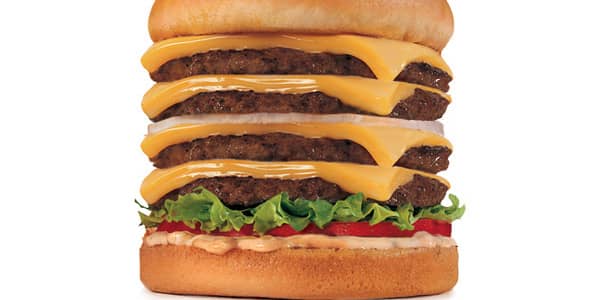Panera Bread announced Wednesday that it will become the first national restaurant chain to voluntarily post the calorie information for its menu items at all 585 of its company-owned locations.
The decision comes as an increasing number of counties and states across the US are requiring chains with a certain number of locations to post the information, mirroring a 2008 New York City law.
But prominently displaying this information at the soup and salad joint could be an eye-opening experience for some diners, as it has maintained a healthy halo despite a number of not-so-healthy offerings.
The fast-casual chain's Chicken Bacon Dijon Panini, for example, has 850 calories, and its Frontega Chicken Panini 860 calories.
Scott Davis, Panera's chief concept officer, said posting the information at stores operated in areas where it is mandated has had no impact on the company's sales. Instead, people shifted their orders to healthier picks, with many selecting the company's You Pick Two option, which offers smaller portion sizes.
These offerings also allow customers to try multiple menu items at once, which Davis said could help drive repeat visits in the future.
"We realized that actually, it was a good thing for our business, not a negative thing," he said.
But although calorie-posting rules have gained momentum from proponents who argue they will help reduce the nation's obesity rate, some say they don't have much of an effect on consumers.
One study by food industry consulting group Technomic, which surveyed 755 people living in the New York City boroughs, found that 82 percent of respondents said the listings impacted what they ordered at restaurants. And recently, a similar study by Stanford University found that New Yorkers lowered their average calorie count when eating at Starbucks, but only by about 6 percent.
Even the Stanford researchers admitted a 6 percent decrease won't have much of an effect on the country's waistline. And Technomic executive vice president Darren Tristano said research shows that many consumers simply don't care about calories.
"Generally Americans are looking for flavor and taste and quality," he said, adding that it's more about how many pounds per dollar one can get. "You don't go out to a restaurant to know what kind of calorie count is in [your food]."
Still, some restaurant chains have decided to voluntarily post their calorie content, believing that consumers want healthier options — they just aren't out there. Energy Kitchen restaurant, for example, is selling customers on the fact that it offers nothing for more than 500 calories, and its same-store sales responded to this decision by rising 30 percent so far this year.
"If you can provide healthy products that consumers want that taste great, why do you need high-calorie options?" said Energy Kitchen investor Mike Repole. "It makes no sense."
Since the New York regulation was passed, similar laws have been made effective in seven areas across the US, they've been enacted in seven more, and they've been introduced or are anticipated in 20 more, according to the National Restaurant Association. National calorie posting laws are also included in the health care reform bill.
More from Consumer Nation:





